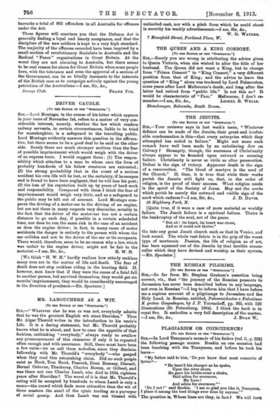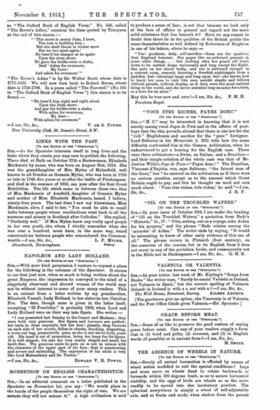PLAGIARISM OR COINCIDENCE?
[To THE EDITOR OF THE "SPECTATOR."] SIR,-In Lord Tennyson's memoir of his father (vol. H., p. 222) the following passage occurs. Ruskin on one occasion had been lunching with the Tennysons, and before he took his leave— "My father said to him, `Do you know that most romantic of lyrics ?— " Ile turn'd his charger as he spake, Upon the river shore, lie gave his bridle-reins a shake, Said adieu for evermore,
My Love !
And adieu for evermore."
'Do I not ? ' said Ruskin. I am so glad you like it, Tennyson.
I place it among the best things ever done by anyone." The question is, Whose lines are they, in fact ? We will turn to "The Oxford Book of English Verse." No. 546, called "The Rover's Adieu," contains the lines quoted by Tennyson at the end of this stanza :— " This morn is merry June, I trow, The rose is budding fain ; But she shall bloom in winter snow
Ere we two meet again.' He turn'd his charger as he spake Upon the river shore, He gave the bridle-reins a shake, Said 'Adieu for evermore,
My Love!
And adieu for evermore." "The Rover's Adieu" is by Sir Walter Scott, whose date is 1771-1832. We will now turn back to Robert Burns, whose date is 1759-1796. In a poem called "The Farewell" (No. 505 in "The Oxford Book of English Verse ") this stanza is to be found :— "He turn'd him right and right about Upon the Irish shore : And gae his bridle-reins a shake, With adieu for evermore, My dear—
With adieu for evermore."
am, Sir, &c., V. DE S. FOWICE.
New University Clwb, St. James's Street, S. W.



















































 Previous page
Previous page